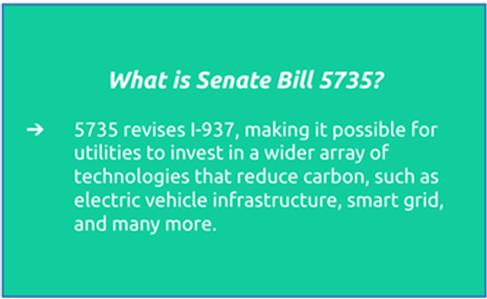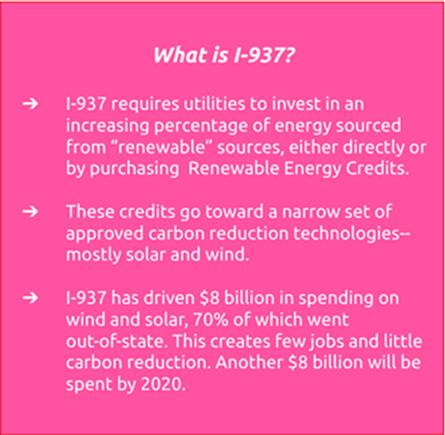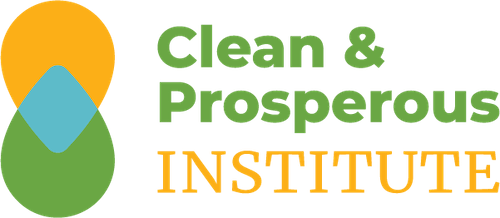(Originally Posted on Plan Washington Website)
Passing Partisanship on the Road to Carbon Reduction
We encourage those concerned about reducing carbon emissions to take a closer look at SB 5735 and to focus their energy on improving it, rather than tearing it down.
Whether the motivation is related to climate change, energy security, air quality, growing the economy, or energy efficiency, carbon reduction is a theme both political parties can embrace.
Earlier this session, Senate Republicans, including Doug Ericksen, Curtis King and Sharon Brown, joined with Democratic Senator Marilyn Chase to introduce a handful of bills on energy efficiency and carbon reduction. In addition, a bipartisan and bicameral EV (Electric Vehicle) Caucus has put forth a compelling slate of bills to encourage transportation electrification. These legislators include: Senators Fain, Hobbs, Hill, Jayapal, Keiser, Lilas, Litzow, McCoy, and Mullet along with Representatives Bergquist, Fitzgibbon, Magendanz, Morris, Muri, Tarleton, and Tharinger.
 As the state continues to debate placing a price on carbon, it is in the best interest of ratepayers to reevaluate how existing carbon reduction policies can be made more effective.
As the state continues to debate placing a price on carbon, it is in the best interest of ratepayers to reevaluate how existing carbon reduction policies can be made more effective.
Over the past decade, I-937 has driven over $8 billion in wind and solar investments. SB 5735 grows the green economy by empowering utilities to support a wider array of low carbon technologies to meet future targets, such as: smart grid, energy storage, electric vehicle charging infrastructure, and the conversion of fleets from carbon intense diesel to cleaner natural gas or electric fuel.
SB 5735 is consistent with the voter intent of I-937: to reduce fossil fuel usage and provide Washingtonians with cleaner air. Enabling utilities to support carbon reduction investments under I-937 is also aligned with the Washington Business Alliance’s strategy to lower emissions by building on our state’s natural advantages, leveraging one of the cleanest and most competitively-priced electricity mixes in the nation.
There is room for refining the details of SB 5735, including the definition of a carbon reduction investment, how a carbon reduction investment is credited to a utility, and some of the technical mechanics. Linking with other pieces of legislation concerning coal by wire and rate of return, we can craft a new vision for our electrical utilities prioritizing greenhouse gas emission reduction through technological innovation, moving away from fixed targets for a limited set of energy sources.
One investment with the potential to drastically reduce Washington’s carbon emissions is transportation electrification. Onroad gasoline and diesel consumption is Washington’s single largest source of carbon emissions. SB 5735 echoes WASHDOT’s recommendation to expand the legislated definition of Renewable Energy Credits to include transportation electrification. When plugged into our state’s predominantly hydro-sourced grid, with the lowest carbon emissions in the US, electric vehicles become a key asset for carbon reduction. Each EV reduces over 80% of the carbon footprint of a conventional car.

At the Washington Business Alliance, we’ve been working toward a comprehensive solution, with research that supports many of the bills circulating in the legislature. We call our approach the Technology Enabled Market Strategy. It has three major pillars:
- Build on Washington’s natural advantage in clean, affordable electricity;
- Improve efficiency in the built environment, and;
- Stimulate the use of low carbon electricity and fuels in transportation.
You can dig into the strategy and a growing library of visualizations and articles at https://www.cleanprosperousinstitute.org/blog/.
The Technology-Enabled Market Strategy is in line with the values of Washington residents. Our manufacturers, food processors, and utilities lead the country and in some industries the world in producing low carbon goods. But we can always do better. Most individuals see energy waste in their own lives too and are looking for ways to improve.
Policymakers need to offer solutions that recognize this shared commitment and return the greatest value back to Washington State. Looking at the technology-focused policy ideas currently moving through the legislature, we see the outline of a promising road forward. This legislative session, we hope all will rise to create a bipartisan outcome for carbon reduction.
David Giuliani, Former CEO and Co-Founder of Clarisonic and Sonicare companies, Board Chair Washington Business Alliance
Mike Sotelo, Board Director Washington Business Alliance, CEO of Consolidar, Founder Association of Washington Hispanic Chambers of Commerce, Chair Seattle Police Foundation
FOR MEDIA INQUIRIES PLEASE CONTACT
Isaac Kastama, Director of Government Affairs
(253) 232-5313 or [email protected]
Based in Seattle, the Washington Business Alliance is a statewide network of business professionals engaged in research and demonstration projects. Our project “Low Carbon Prosperity” is focused on proactive business community solutions toward achieving state carbon reduction goals.
